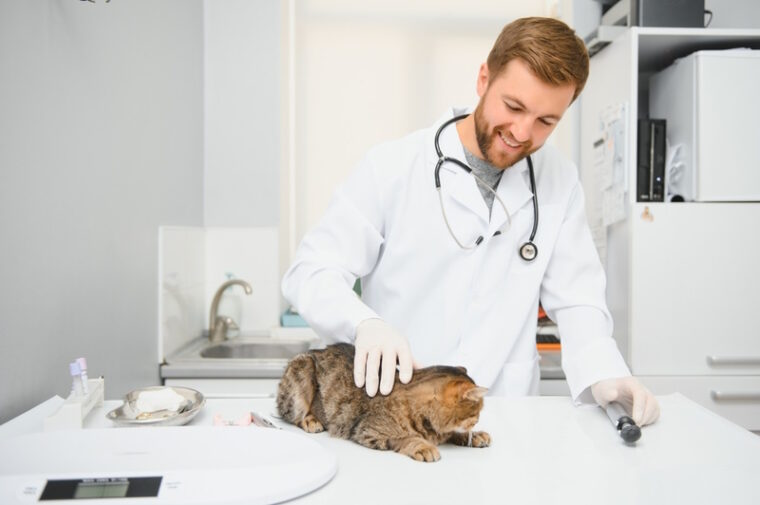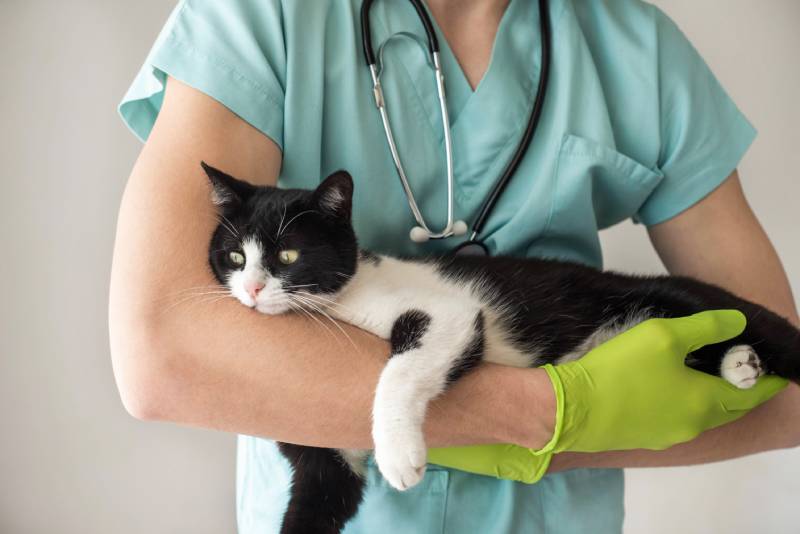
Taking your cat to the vet for their annual checkup is an excellent way to monitor your beloved pet’s health and ensure that they’re getting the best care they can receive. It is also the best way to pick up any health concerns before they become a major problem. Most annual vet visits will consist of a full cat wellness exam, which typically includes a physical exam, dental check, weight check, and may also involve screening tests, and vaccinations.
Cat checkups help determine the status of your cat’s health and can often detect any diseases or health issues at their early stages. There will be variations depending on your cat’s age and health status, as well as your vet’s protocol, but here are some common things you can expect to take place during a cat checkup.
The 6 Things to Expect at a Vet Checkup for Your Cat
1. Physical Exam

A cat wellness exam will primarily consist of a general physical exam. Veterinarians will examine your cat’s overall physical appearance and check for anything unusual or concerning. This will involve a weigh-in, which will help veterinarians determine if your cat is at a healthy body weight. Veterinarians will also check your cat’s skin and coat, eyes, ears, and mouth.
Your veterinarian will listen to your cat’s heartbeat and breath. They’ll also feel for any muscle abnormalities and feel your cat’s abdomen to check for anything unusual with certain internal organs like the bladder, liver, and stomach.
2. General Wellness Questions
Your veterinarian will also ask you questions regarding your cat’s health during a cat wellness exam. They may ask you if you’ve noticed any strange behaviors or changes in eating habits. They can also ask how much exercise your cat engages in and what your cat’s diet consists of.
You can also take this time to ask your veterinarian any questions you might have. So, make sure to come prepared to ask medical-related questions. It’s often helpful to write them down somewhere so that you can quickly retrieve them and get some answers.
The information you provide is really important; cats cannot speak for themselves, so it’s up to you to let the vet know if there is anything strange, different, or worrying.
3. Bloodwork

In some cases, your veterinarian will recommend a blood test. This is more commonly recommended if your cat is older than ten years, or is on any regular medication. A blood test will provide a complete blood count (CBC), which provides information on the different types of cells found in your cat’s blood, such as red blood cells, white blood cells, and platelets. It can also identify any abnormal cells.
Serum biochemistry can give us a lot of information about liver and kidney function, as well as check for signs of diabetes or hyperthyroidism.
4. Urine Sample
This simple test can provide a huge amount of information about the health of your cat. Just a few drops of urine can give your vet a good idea of your cat’s kidney function, check for signs of blood or infection, even rule out diabetes. With a little bit more, they can make sure your cat doesn’t have any crystals or bacteria in the urine. Ask your vet for tips on collecting a good urine sample. If you can’t collect one at home, your vet may be able to obtain one when they are doing their examination.
5. Vaccinations

The types of vaccinations your cat receives will depend on their age. Kittens often go through a vaccine schedule for core cat vaccinations. A core cat vaccine known as the FVRCP cat vaccine protects cats against feline rhinotracheitis, feline calicivirus, and feline panleukopenia. Kittens typically get their first vaccination when they’re between 6 to 8 weeks old. They then receive a series of booster shots that are administered every 3 to 4 weeks.
Another core cat vaccination is the rabies vaccine, which can be administered to kittens that are about 12 weeks old. Your veterinarian may also recommend a vaccine for feline leukemia virus (FeLV) if your kitten is at risk of the disease.
Even indoor cats should be vaccinated, but the vaccine intervals may vary if their risk of exposure is low. Talk to your vet about what they recommend for your cat, based on their risk factors.
6. Parasite check
As part of the physical exam, your vet will take a look at your cat’s coat and skin, looking for any signs of external parasites like fleas. They may even ask you to provide a fecal sample to check for internal parasites.
If your cat is on regular flea or worm prevention, additional tests probably won’t be needed.
Hot tip: If your kitty isn’t always the easiest to give a tablet to, ask your vet to pop their wormer in while they’re there!
How Often Should Cats Have Wellness Exams?
The number of cat wellness exams your cat has in a year will depend on their age and overall health. Young kittens often have monthly wellness exams at least until they’ve completed their core cat vaccination schedule. Healthy adult cats typically have an annual cat wellness exam. It’s recommended for middle-aged and senior cats to have bi-annual wellness exams. Cats on long term medications will often need to be examined at least twice a year, sometimes more, depending on the condition being managed.

Conclusion
Cat wellness exams are an important part of your cat’s overall health and well-being. They can ensure that your cat is healthy and help you determine if you need to make any changes to their lifestyle. Wellness exams are also used for early-detection purposes and can end up saving your cat’s life by providing effective treatment during the early stages of a disease. So, even if it doesn’t seem like much is going on during a wellness exam, make sure to schedule your cat for their routine exams consistently. Take the opportunity to ask any questions you may have, and provide any details you think might be relevant, however minor.
Featured Image Credit: Hryshchyshen Serhii, Shutterstock







